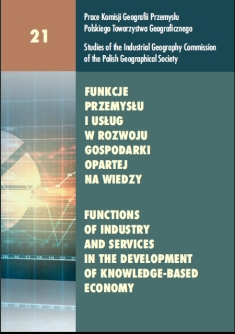The Military Industry as the Development Factor of a Knowledge-Based Economy
DOI:
https://doi.org/10.24917/20801653.21.8Keywords:
military industry, weaponry, ranking, aviation, navy, tanks, vehicles, missles, technologyAbstract
The aim of the paper is to present and compare the most sophisticated and advanced heavyweaponry as the examples of the newest technologies in the knowledge-based national economies. Themilitary industry influences an economy not only during war. As a part of different industrial sectors,it has exceptional characteristics. It is obvious when one can see so many inventions and innovationsoriginated in the military sector. Examples presented in this paper facilitate realizing what the benefitsof a developed military industry for a national economy are. Keeping in mind the above-mentioned roleplayed by military sector for an economy, it will make it possible to avoid catastrophic fate for countriesin future military conflicts. Developed the military industry brings not only innovations in any branchof economy, but also increases security. Incomes from weaponry exports should be considered as well.Downloads
Metrics
References
Alvarez, C. (2011). AH-1Z Super Cobras. North Mankato: Bellwether Media.
Borkowski, W., Rybak, P., Hryciów, Z., Wysocki, J., Papliński, K., Michałowski, B. (2011). Operational loads for combat vehicles. Journal of KONES Powertrain and Transport, 18, 1, 77–84.
Fiszer, M. (2011). Lotnictwo w osiąganiu celów strategicznych operacji militarnych. Warszawa: Trio.
Fukuyama, F. (1996). Koniec historii. Poznań: Zysk i Spółka.
Gałganek, A. (2011). Maszyny wojny. Technologia militarna w społecznej historii stosunków między¬narodowych. Przegląd Strategiczny, 2, 15–41.
Holtom, P., Bromley, M. (2012), Implementing the Arms Trade Treaty: Mapping Assistance to Strenghten Arms Transfer Control. SIPRI Insights to Peace and Security, 2, 2–20.
Holtom, P., Wezeman, S.T., Wezeman, P.D., Bromley, M., Kelly, N., Buchhold, C. (2012). International Arms Transfers. Solna: SIPRI.
Jackson, S.T. (2012). The SIPRI top 100 arms-producing and military services companies 2010. SIPRI Yearbook 2012. Pozyskano z: http://www.sipri.org/yearbook/2012/05.
Kajetanowicz, J. (1995). Bojowe wozy piechoty. Warszawa: Bellona.
Lakomy, M. (2010). Znaczenie cyberprzestrzeni dla bezpieczeństwa państw w XXI wieku. Stosunki międzynarodowe, 42, 3–4, 55–71.
Milmo, D. (2012). BAE/EADS merger off as Angela Merkel refuses to endorse a deal. The Guardian, 10, 10. Pozyskano z: http://www.guardian.co.uk/business/2012/oct/10/bae-eads-merger-off-political-concerns.
Miłoszowska, D. (2009). Nowy Porządek Świata jako polityczna forma globalizacji. Geopolityka, 1(2), 41–47.
Münkler, H. (1994). Wojny naszych czasów. Kraków: WAM.
Parson, C.R., Miller, J.O., Weir, J.D. (2011). Simulation and Analysis of Mission Capability Degrades Due to Supply for the B-1 Bomber. The Journal of Defense Modeling and Simulation: Applications, Methodology, Technology, 9, 3, 279–290.
Perlo-Freeman, S., Sköns, E. (2008). The private military services industry. SIPRI Insights on Peace and Security, 1, 1–20.
Perlo-Freeman, S., Solmirano, C., Kelly, N., Buchhold, C., Wilandh, H., Abdul-Shafi, W. (2012). Military Spending and Armament. Solna: SIPRI.
Rachwał, T. (2011). Industrial restructuring in Poland and other European Union states in the era of economic globalization. Procedia – Social and Behavioral Sciences, 19, 1–10.
Wilczyński, P.L. (2011). Uwarunkowania geograficzne i zróżnicowanie regionalne konfliktów zbroj¬nych na świecie po II wojnie światowej. Łódź: WNG UŁ (rozprawa doktorska).
Downloads
Published
How to Cite
Issue
Section
License
Articles are published under the terms of the Creative Commons License (CC BY-ND 4.0; Attribution– NoDerivs).

